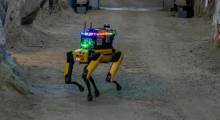Even as the U.S. economy recovers from the COVID-19 pandemic, the shortage of skilled labor in manufacturing persists, threatening the nation's competitiveness. In May, the Advanced Robotics for Manufacturing, or ARM, Institute launched RoboticsCareer.org as an online resource to help address workforce challenges.
The Pittsburgh-based ARM Institute is a public-private consortium backed by the U.S. Department of Defense with more than 300 members from academia, government, and industry. It seeks to help manufacturers through the adoption of robots and workforce development programs.
RoboticsCareer.org identifies core competencies that employers are seeking, recognizes education and training programs, and helps connect job seekers with careers in robotics and manufacturing. It lists programs at more than 1,200 educational organizations across the U.S. and its territories.
“We've been in the process of rolling it out more fully,” said John Zappa, senior product manager at the ARM Institute. “We've been presenting at the National Association of Workforce Boards and building awareness with regional boards and MEPs [Manufacturing Extension Association Partnership Program members]. We're open to partnering with others.”
RoboticsCareer.org makes nationwide effort
Just as the challenge facing manufacturers is nationwide, so too is the ARM Institute's effort to connect them with talent, workforce development programs, and robotics-related resources.
“We continue to fill up coverage of all 50 states and U.S. territories,” Zappa told Robotics 24/7. “We're looking at certain states to expand coverage of programs [in them] and are deepening the pool of available programs to ensure that they're connected to core competencies.”
RoboticsCareer.org recently made its first three endorsements of institutions—are more on the way? “We have another 20 in the queue,” replied Zappa. “It's like an ISO review of programs. We look at the curriculum, graduation rates, and instructors.”
“Each institution is reviewed by auditors,” he added. “It's a lengthy process, but we're confident that when a badge is ascribed that there's real meaning behind it.”
Some of the ARM Institute's members have been designated as auditors, and Linda Wood, senior certification manager, has an extensive background in educational and certification processes, Zappa said.
“She manages the team, and when a school or program applies, she allocates who'll be lead auditor,” he explained. “They review documentation, financials, placement statistics, and the backgrounds of the instructors. They also make site visits and see the equipment. The process takes a couple of months.”
ARM looks for competency development
“Of those we've reviewed so far, Witchita State University and Horizon Science Academy Columbus High School have programs that teach competencies,” said Zappa. “They showed that they're actually teaching skills that will equip people with competencies such as fluid power. It's one of eight needed for robotics technicians.”
Is there an age limit for the programs? “No. It goes back to skills development,” Zappa said. “Whether it's a STEAM [science, technology, engineering, and mathematics] academy or a four-year degree program, it just needs to demonstrate that someone can learn these competencies.”
“We've analyzed 10,000 programs—two-thirds are traditional four-year degrees, but 26% of programs are at community colleges, technical colleges, or trade schools,” he added. “We want to make sure companies can fill entry-level roles, and we want clear coverage and access to programs that can help people.”

“The definitions of competencies and career paths could influence future academic and training programs,” noted Zappa. “They could be written into job descriptions and influence training providers. We didn't invent this concept—the PMI [Project Management Institute] did, so the industry thinks this is important. As employers adopt and recognize standardized outcomes in certain domains, the value builds on itself.”
“We're also supporting the Department of Defense, helping the U.S. Army with transitioning military members,” he said. “We'll ultimately engage employers with providing job-matching capabilities over time.”
Participation to grow
“We'd like to grow the endorsement pool of candidates, whether it's institutions applying on their own or finding a local foundation providing a scholarship for a community college to go through the process,” Zappa said.
How does RoboticsCareer.org evaluate the budget allocated to robotics and training? “Since some mechatronics programs are specific to a department, like a dean at a specific college, rather than a broader institutional budget, we're not evaluating all institutions like a regional accreditor would,” Zappa replied.
How has the wider manufacturing and automation ecosystem reacted to the ARM Institute's new resource? “Feedback from the community and our members has been very positive,” said Zappa. “One thing that people gravitate to is that we've taken the time to develop the competencies that employers are looking for. We've mapped programs to these competencies.”
“We're seeing that companies can link jobs into these competencies, and job seekers can find robotics career paths, such as technician or specialist integrator,” he said. “As we go forward, we'll take a closer look of geographic coverge of programs, looking for gaps in robotics programs. There's also an opportunity for data analysis that could inform policy.”
“Our main focus right now is to grow awareness of RoboticsCareer.org through outreach,” said Zappa.
About the Author
Follow Robotics 24/7 on Linkedin
Article topics
Email Sign Up
















